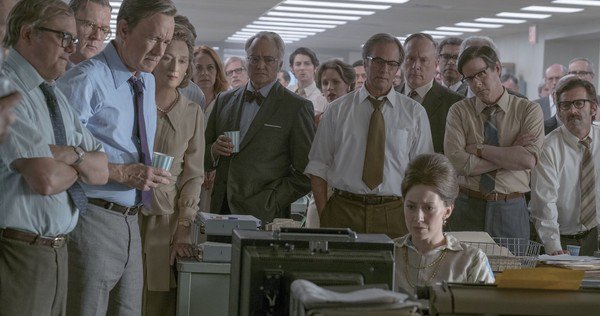Steven Spielberg shot “The Post,” about how the Washington Post bucked Richard Nixon and published the Pentagon Papers, in just a couple of months. He started in July, and here it is, ready for release and the Oscars. It was a killer shoot but it was worth it.
The minute Meryl Streep comes onto the screen as publisher Katharine Graham, you feel bad for the other actresses who are so good this season and have been getting so much attention. That’s because Streep somehow does it again, she embodies a person we only knew publicly to the point where you’re sure it’s that person– it’s Graham herself mourning her husband (who committed suicide) and her father (who gave running of the paper to the husband, not to her, because she was a woman). And you see Graham’s story arc clearly from silenced and mousy to brave and defiant. It’s wonderful.
Tom Hanks is sensational as Ben Bradlee, the editor of the Post who a year after this story ended had to confront an even bigger one with Watergate. Hanks makes everything look easy but make no mistake– his Bradlee is a real construct, built from the editor’s brashness and determination. Hanks started this work on Broadway a couple of years ago as Mike McAlary in Nora Ephron’s “Lucky Guy.” He’s got the temperament of throwback newsmen on all the right notes.
“The Post” should be a big hit simply because Spielberg has made it a rallying cry against Fake News. It’s an endorsement of the Press as the watchdog of Washington, and shows the mechanism that brings a story like the Pentagon Papers to life. If you don’t already, in sum: Robert McNamara (played here by Bruce Greenwood just brilliantly) commissioned a study on the history of the Vietnam War and why we were still in it, in 1971. From the study he knew were losing the war, that it was unwinnable, but lied to the country that we were making progress.
Daniel Ellsberg (Matthew Rhys, excellent) was the whistleblower who turned the study over the to New York Times. They published it and Richard Nixon retaliated by getting an injunction against them. Ellsberg got more of the papers to the Post, and they defied Nixon’s White House. At the time, Graham was taking the Post public on the American Stock Exchange, and there was fear that the scandal of butting heads with Nixon would kill the deal. The paper, as the movie states, was near insolvency.
Of course, it’s easy to look back and say it all worked out. But in real time, then, things were not so clear. Nixon, like Trump, was a tyrant. Spielberg has the luxury now of using the real Nixon tapes so we can hear his plotting with cronies to destroy press freedoms. But when it really happened, we were scared– no one knew what Nixon was doing, or what the outcome would be. These (mostly) men and women put their careers on the line to get the truth about Vietnam to the people.
And then Watergate happened, which figures in this movie very cleverly. In many ways “The Post” is the prequel to “All the President’s Men.” Its ending is a little like Princess Leia at the end of “Rogue Nation,” handing off the plans to the Death Star.
Well, I really love “Dunkirk” and “Lady Bird” and “Phantom Thread,” “The Shape of Things,” etc. But the Best Picture is the movie with the Big Idea. “The Post” is that Big Idea. It gets a standing ovation.
PS Special mention to Bob Odenkirk, who’s wonderful as Ben Bagdikian, who pushed the story along at the paper. Also Michael Stulhbarg as Abe Rosenthal, and all the other well cast supporting parts. Greenwood has really become Benjamin Button. He’s top notch as McNamara, whose friendship with Graham gives texture and (information) to the film.

